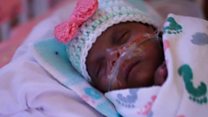The Will To Live
"I thought, 'Oh my God, I can't believe how small she is. We weren't expecting anyone this small. I was stunned, frankly."
"We just sat by her bedside the first six hours. I thought her chances of making it probably weren't good. I told the folks every hour I would update them, but there's a good chance she's going to die."
"Many babies like this go home on oxygen, which I thought she probably would, but no, she weaned off of it [she was breastfeeding well and had no need of a feeding tube]."
"The fact that she's done so well is just such a reward, and just makes the whole team feel wonderful."
Dr. Paul Wozniak, neonatologist, Sharp Mary Birch Hospital for Women & Newborns, San Diego
"It was the scariest day of my life. I just felt very uncomfortable, and I thought maybe this is part of the pregnancy."
"I kept telling them she's not going to survive, she's only 23 weeks."
"But that hour [doctors telling the baby's father he would have but an hour with the newborn before her death] turned into two hours, which turned into a day, which turned into a week."
Mother of "micro-preemie", name withheld on request

"For comparison, at birth she was roughly the same weight as a large apple or a child's juice box", said Trisha Khaleghi, senior vice president and chief executive of the hospital where a premature infant was born weighting 8.6 ounces. That weight and the vastly abbreviated gestation appeared at first to mark the newborn's fate; doctors did not expect her to survive, and nor in fact did her parents. Before her delivery, doctors thought they would be dealing with a baby just under a pound in weight at 400 grams, so when she arrived much tinier, they were in shock.
The baby, named by hospital staff while she remained in hospital as Saybie, is believed to be the world's smallest infant to survive such an early birth. A database maintained by the University of Iowa, Tiniest Babies Registry, indicated that baby Saybie weighted seven grams less than the previous smallest, a baby girl born in 2015, in Germany.
Saybie's mother, halfway through her pregnancy suddenly felt peculiar. A medical examination revealed that she had preclampsia, a condition which is known to cause high blood pressure, and which, if left untreated, can lead to serious, even fatal, complications for mother and baby. According to Dr. Dana Chortkoff who delivered Saybie, the mother had "severely elevated blood pressure"; if the baby were to be saved, it was imperative that she be delivered.
The survival rate in the United States for babies born so prematurely is about 20 percent, so the odds for survival were not great. Saybie wasn't breathing when she was born but she "had a good heart rate", said Dr. Wozniak, leading her parents to make the decision that with a heart rate "they wanted everything done" that might enhance her opportunity to survive against the odds. The baby's diminutive size was a challenge even to access properly-sized medical equipment.
The resuscitation beds' built-in scales could not even register her weight, since they weren't able to go below 300 grams. The first order of business for the neonatal team was a breathing tube. They started with a tube the size of a juice-box straw, cut it down to comparative size, and were able to insert it. The baby was warmed, dried off, given medicine to aid her breathing, and then the wait began.
Medical staff observed that the baby gradually improved over time, gaining weight as they continued to be concerned over the types of life-threatening medical challenges such micro-preemies face; challenges such as brain bleeds, lung and heart issues, but Saybie "experienced virtually none" of the expected complications. Little joyful signs were plastered on the walls around the crib that Saybie was placed in, keeping track of her weight and milestones.
"No more breathing tube", read one of those signs. Another said "Tiny But Mighty."
 |
| This April photo shows Saybie at four months old. She was born in December at 23 weeks and three days into her mother's pregnancy. (Sharp HealthCare/Associated Press) |
Dr. Wozniak looks beyond the present time and all the hurdles that the baby has somehow managed to transcend. The host of health complications that potentially could have been deadly for a premature infant born before 28 weeks, failed to materialize. Nearly five months after her birth and the prolonged stay in the neonatal intensive care unit, Saybie went home with her parents, a "healthy 5-pound infant".
At last contact between Dr. Wozniak and the baby's mother, the tiny girl's weight was 6 pounds, 2 ounces "and doing great". Still, worries Dr. Wozniak, things could eventually be more concerning as she matures. Saybie could develop mild vision problems, fine motor issues, language delays or other learning disabilities, not known to appear before such infants are of school age. A protocol of regular visits to the hospital's NICU Follow-Up Clinic is set to ensue to help promote her health and growth.
 |
| Baby Saybie is believed to be the world's tiniest micro-preemie. She weighed about half a pound at birth, but is five pounds in this photo, taken Tuesday. (Sharp HealthCare/Associated Press) |
Labels: Newborn, Premature, Survival, United States

0 Comments:
Post a Comment
<< Home